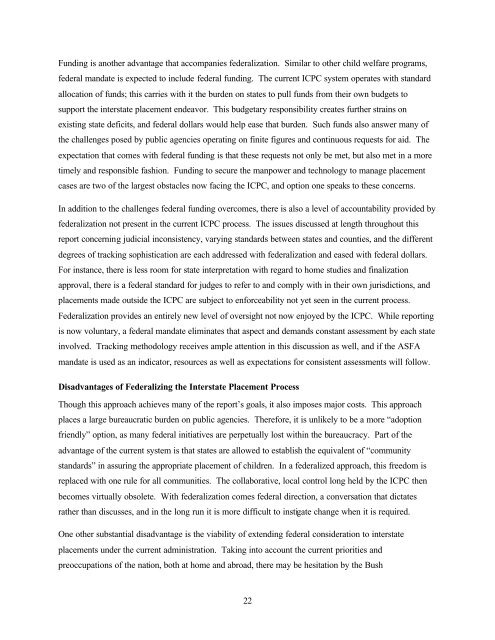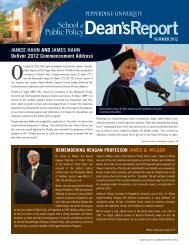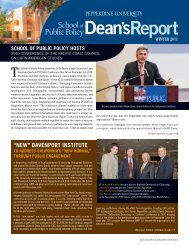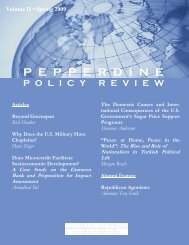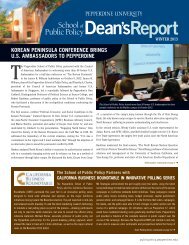Finding Permanent Homes for Adoptable Children - Pepperdine ...
Finding Permanent Homes for Adoptable Children - Pepperdine ...
Finding Permanent Homes for Adoptable Children - Pepperdine ...
You also want an ePaper? Increase the reach of your titles
YUMPU automatically turns print PDFs into web optimized ePapers that Google loves.
Funding is another advantage that accompanies federalization. Similar to other child welfare programs,<br />
federal mandate is expected to include federal funding. The current ICPC system operates with standard<br />
allocation of funds; this carries with it the burden on states to pull funds from their own budgets to<br />
support the interstate placement endeavor. This budgetary responsibility creates further strains on<br />
existing state deficits, and federal dollars would help ease that burden. Such funds also answer many of<br />
the challenges posed by public agencies operating on finite figures and continuous requests <strong>for</strong> aid. The<br />
expectation that comes with federal funding is that these requests not only be met, but also met in a more<br />
timely and responsible fashion. Funding to secure the manpower and technology to manage placement<br />
cases are two of the largest obstacles now facing the ICPC, and option one speaks to these concerns.<br />
In addition to the challenges federal funding overcomes, there is also a level of accountability provided by<br />
federalization not present in the current ICPC process. The issues discussed at length throughout this<br />
report concerning judicial inconsistency, varying standards between states and counties, and the different<br />
degrees of tracking sophistication are each addressed with federalization and eased with federal dollars.<br />
For instance, there is less room <strong>for</strong> state interpretation with regard to home studies and finalization<br />
approval, there is a federal standard <strong>for</strong> judges to refer to and comply with in their own jurisdictions, and<br />
placements made outside the ICPC are subject to en<strong>for</strong>ceability not yet seen in the current process.<br />
Federalization provides an entirely new level of oversight not now enjoyed by the ICPC. While reporting<br />
is now voluntary, a federal mandate eliminates that aspect and demands constant assessment by each state<br />
involved. Tracking methodology receives ample attention in this discussion as well, and if the ASFA<br />
mandate is used as an indicator, resources as well as expectations <strong>for</strong> consistent assessments will follow.<br />
Disadvantages of Federalizing the Interstate Placement Process<br />
Though this approach achieves many of the report’s goals, it also imposes major costs. This approach<br />
places a large bureaucratic burden on public agencies. There<strong>for</strong>e, it is unlikely to be a more “adoption<br />
friendly” option, as many federal initiatives are perpetually lost within the bureaucracy. Part of the<br />
advantage of the current system is that states are allowed to establish the equivalent of “community<br />
standards” in assuring the appropriate placement of children. In a federalized approach, this freedom is<br />
replaced with one rule <strong>for</strong> all communities. The collaborative, local control long held by the ICPC then<br />
becomes virtually obsolete. With federalization comes federal direction, a conversation that dictates<br />
rather than discusses, and in the long run it is more difficult to instigate change when it is required.<br />
One other substantial disadvantage is the viability of extending federal consideration to interstate<br />
placements under the current administration. Taking into account the current priorities and<br />
preoccupations of the nation, both at home and abroad, there may be hesitation by the Bush<br />
22


